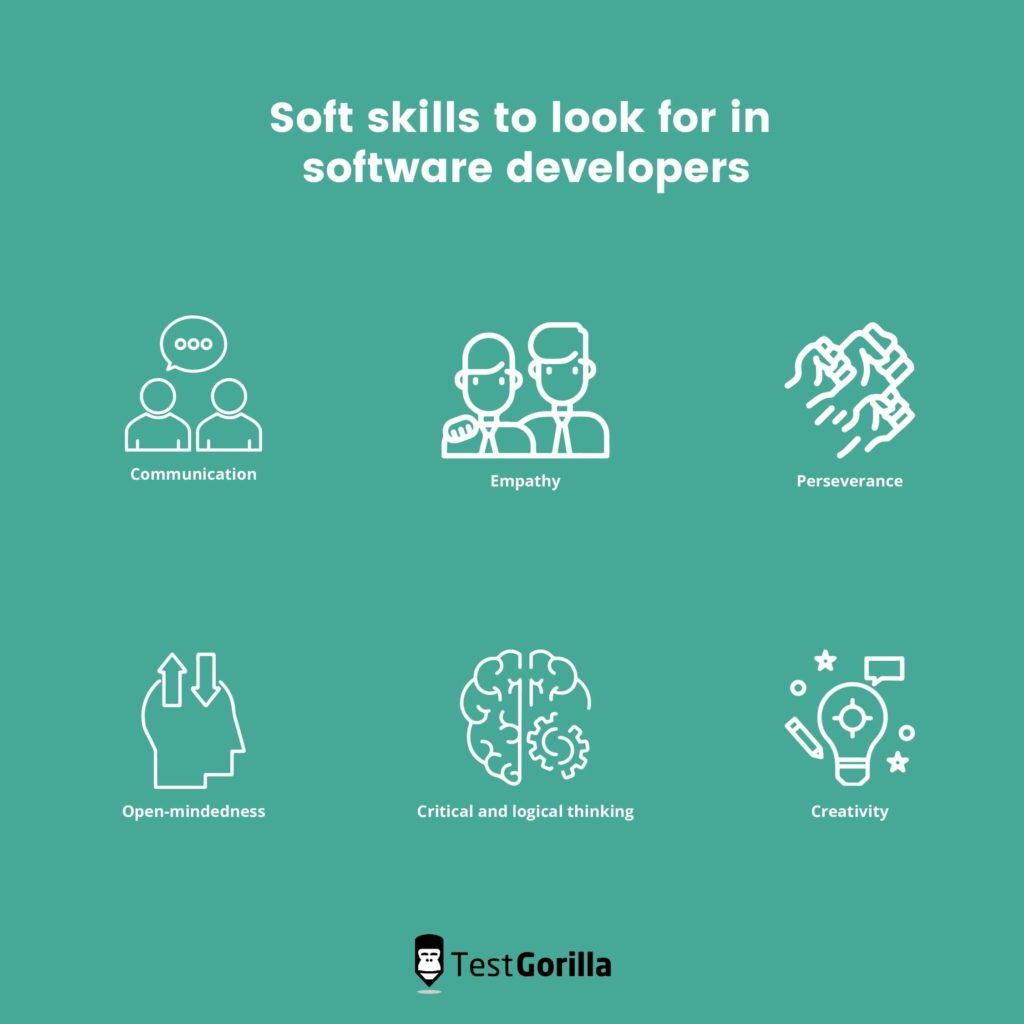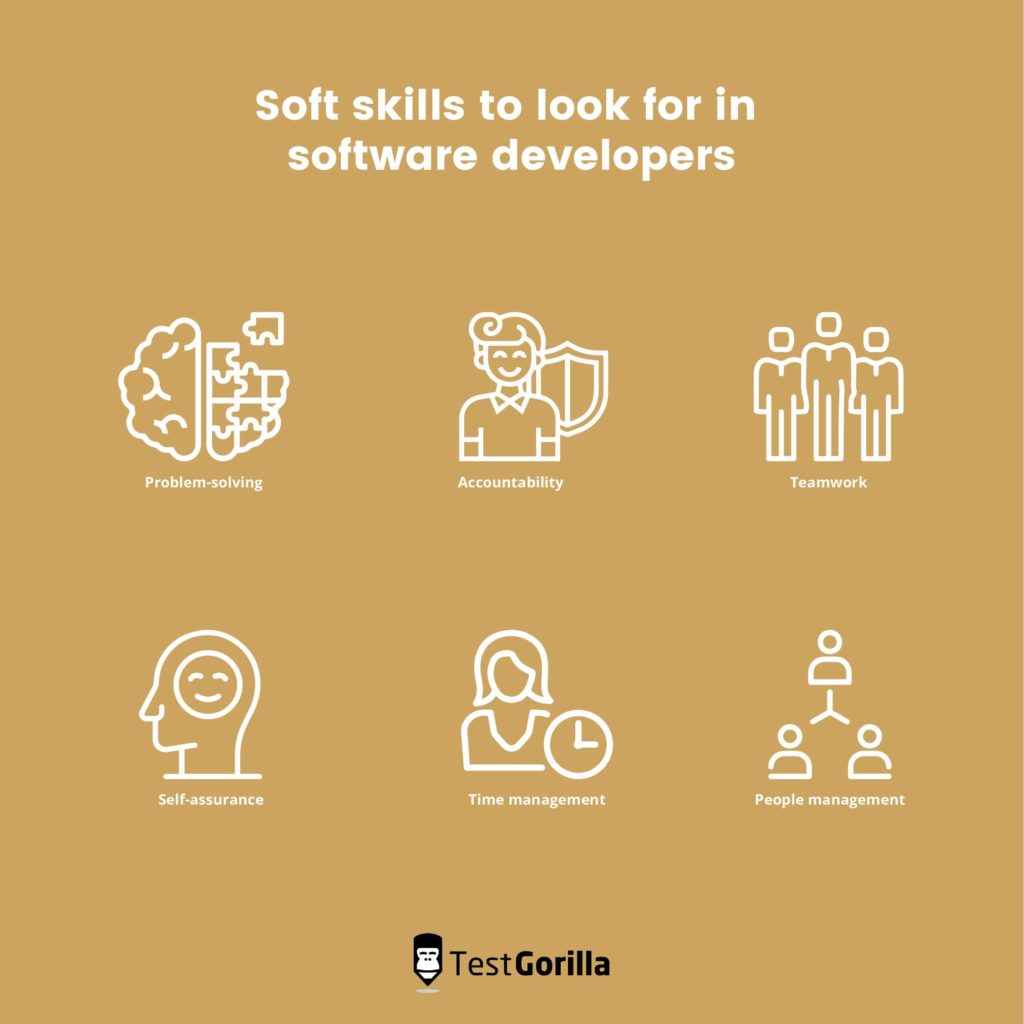Table of contents
- Beyond hard skills: What soft skills to look for in software developers?
- Six interview questions to reveal soft skills in software developers
- How can recruiters and hiring managers evaluate soft skills in a technical interview?
- Why assess soft skills in software developers?
- Look for and assess soft skills in software developers to hire top talent
According to GoRemotely, there are 4.4 million software developers in the US.
Employment in this field is still anticipated to grow 21% by 2030, therefore making up an increasing portion of the workforce.
Recruiters and hiring managers are expecting more than just technical skills – they want soft skills too.
Non-technical recruiters and hiring managers who look for soft skills need to know which soft skills to look for and how to accurately assess them. These can be challenging, but this article will explain how you can effectively do both.
Beyond hard skills: What soft skills to look for in software developers?
Let’s dive straight in with the specific soft skills you should look for as a hiring manager or non-technical recruiter, and then we can think about how to evaluate soft skills in a technical interview.
1. Communication with team members
Yes, communication skills are important for various fields, but they’re critical in software development. Communication doesn’t mean doing all the talking all the time, although you might be hiring an engineering manager who will need to communicate with the entire team in one-on-ones and team meetings.
What it does mean is that candidates should be able to use active listening skills during one-on-ones with engineering managers to constantly learn new technical skills. They should also avoid interrupting others or discussing points too quickly.
Another important trait to look out for is how well candidates pick up on nonverbal cues. Even remote software developers will need to join video calls to resolve conflicts with testing colleagues, and they must master nonverbal communication to avoid jeopardizing future work or making mistakes.
2. Empathy when collaborating
Software developer candidates are constantly using technology, but many aspects of their role involve using empathy when collaborating with clients and teams. It’s not just about working with machines and new technology!
When candidates can see complex issues from another team member’s perspective, they show themselves to be open-minded.
When hiring, look for signs that candidates can take the client’s requirements into account , which is a sign of emotional intelligence. You can see this by asking the right interview questions and follow-up questions (some of which are listed below).
3. Perseverance for complex projects
Complex projects and complex processes: These are two challenges that software developer candidates will encounter frequently in their roles. The best way candidates can handle them is with perseverance.
Perseverance involves acknowledging that they will make coding errors. It requires dedicating time to those errors and fixing them step-by-step. And it means being patient with testers who might find errors and point them out.
You can use technical interviews to assess candidates for perseverance. They’re designed to challenge candidates and test their ability to think under pressure.
4. Open-mindedness to change and the ability to adapt
There is always room for software developer candidates to grow, and one skill candidates can use to help them develop is open-mindedness.
Employees should try new ideas and explore new programming languages that might not be offered by your organization. For instance, if your organization doesn’t use PHP, but an employee can see that PHP might be an advantage, they should branch out and use it.
The other side of the coin is adaptability. If software candidates are unfamiliar with the programming languages and frameworks you use, they should be willing to research these and adapt to using them.
Assess candidates’ open-mindedness by asking the right interview questions. You’ll find some ideas for soft skill-related interview questions listed below.
5. Critical and logical thinking
The Oxford English dictionary defines critical thinking as “the objective analysis and evaluation of an issue to form a judgment,” while switchup.org defines it as “Looking closely at the information in front of them and using it to make a logical decision.”
Candidates should think through the pros and cons of every possible approach. This is important, because they might not be able to proceed with certain decisions or change their approach midway through the process without thinking about how they affect the team.
Test candidates’ critical and logical thinking with a coding skill test, such as:
PHP (coding): intermediate-level algorithms tests
SQLite (coding): intermediate-level querying tests
6. Creativity and the ability to improvise
Creativity and improvisation are also critical in this field, as they are central to solving complex problems and innovating. Designing data structures, backend services, and UI interfaces all require creativity, explains Tom Hunter on LinkedIn.
You can learn more about candidates’ creative skills by asking them to complete custom questions as part of a comprehensive assessment.
Top skill-testing platforms have video and essay custom questions: Distribute them, compare candidates’ responses, and see how they align with your organization.
7. Problem-solving
According to Springboard, software engineering is about problem-solving first, coding second. Problem-solving is a software developer’s most difficult task alongside compiling instructions to solve issues.
The specific types of tasks software engineers have to undertake include:
Identifying buggy code to ensure programs run as expected
Learning about the new frameworks and programming languages when writing code
Working on new features by testing code and communicating with a team
Find out more about software developer candidates’ problem-solving skills with a technical interview.
8. Accountability
Owning up to mistakes counts as a soft skill for software developers. Why? Because it can help candidates grow in the role, develop their skills, and recognize how to avoid repeating mistakes by validating thoughts and ideas.
Even if candidates consider themselves masters of a certain tech stack, if they make an error using a particular programming language they should be able to admit to it and remain humble.
This is important when working with a team, because accountability can lead to better team cohesion, an increase in commitment, and higher performance.
9. Teamwork
Team members that software developer candidates will work with will include testers, designers, engineering managers, clients… the list goes on. Candidates should use and show a combination of subskills to make team collaboration simpler.
As well as empathy and accountability, your developer candidate will also need to be supportive of team members. This is one of the ways you know your team is working effectively.
10. Self-assurance
According to digital platform creator Stephen Miracle, a requirement to becoming a good software developer is self-confidence. This will help candidates achieve their full capabilities and grow within the role.
Because, even though they can check internet browsers such as Google or websites like Stack Overflow to solve complex projects, according to senior software engineer Cristina Ruth, candidates should have the confidence to try something even if it’s hard.
11. Management skills (including time and people)
Are you planning to hire a software engineering manager? Candidates who apply for these roles should recognize that the role is heavily weighted towards people skills and that tech skills might be used less frequently.
Software engineers of all experience levels should have time management skills. Even if they work flexibly or from home, they will have to provide approximate times and estimates for when projects will be completed to meet deadlines.
Six interview questions to reveal soft skills in software developers
If you use the following behavioral questions during the non-technical interview, always remember to ask follow-up questions to learn more about candidates’ soft skills:
Have you ever miscommunicated with an engineering manager, superior, or team member? How did this get resolved?
Can you describe a time when you had to support a junior engineer? What steps did you take and what was the outcome?
Describe a time where you collaborated on a project that went wrong. How did you fix the errors?
Can you explain which computer programming languages you don’t like? Now explain some of the advantages of those programming languages.
Have you ever disagreed with a team member? How did you resolve the disagreement?
Can you provide an example of a time in which a bad decision caused a project to fail? What would you do differently now?
The best insights on HR and recruitment, delivered to your inbox.
Biweekly updates. No spam. Unsubscribe any time.
How can recruiters and hiring managers evaluate soft skills in a technical interview?
Although you’ll conduct technical interviews primarily to assess candidates’ technical abilities, you can combine them with other methods, like skill assessment tests, to verify soft skills too.
Follow these four steps to assess a candidate’s soft skills in detail:
1. Give candidates a skills assessment when you first receive their application to help you study the interviewee before an interview.
Skills assessments combine several tests, like coding and cognitive skill tests; these will help you assess technical and soft skills simultaneously.
2. Go through the job description with candidates in the technical interview and clarify the job’s responsibilities and expectations.
Ask questions related to the job description such as the following for an initial assessment of the candidate in line with what the role requires:
Which related responsibilities do you think the role will demand?
How will you make a valuable impact during the role?
Are there any aspects of the job description you don’t understand?
Score and compare candidates’ responses to each of these questions and look to see whether their answers align with your organization’s values.
3. Ask candidates questions related to their approaches to solving programming problems, and take note of candidates who have the soft skills you’re looking for.
For instance, you might ask:
Have you ever experienced a delay when working on a project? How did you explain this to your client?
Have you ever been asked to take a different coding approach that didn’t align with your initial choice? Which steps did you take?
How has company expansion influenced the way you communicate with team members and project managers?
Again, score the responses from all candidates and analyze whether they align with your organization’s team culture. Eliminate candidates who don’t match your expectations.
4. Have the results of the skills tests to hand when conducting the technical interview.
Use them as talking points during the interview. And when the interview is finished, make comparisons between resumes and test results to learn how their technical and soft skills match up.
If there are discrepancies between a candidate’s resume, their skills test, and their technical interview, you might choose to eliminate them from the hiring process.
Why assess soft skills in software developers?
A combined research effort between HR Research Institute and Fierce Inc. found that 85% of HR professionals surveyed believe soft skills are important to long-term success.
You should value soft skills in software developers not only because they help employees thrive in the workplace and help candidates build networks within organizations. Test soft skills because they indicate how rounded candidates are.
But any candidate can claim to have empathy or good communication skills on a resume. That is why you should use assessments for soft skills in software developers.
Look for and assess soft skills in software developers to hire top talent
Soft skills make an important difference to software developers. As well as looking for a problem-solver or a critical thinker, search for candidates who are:
Team players
Self-assured
Empathetic
Creative
Able to take responsibility for their errors
Remember to use a comprehensive hiring process that features skills testing, in-depth interviews, and technical interviews.
Check whether candidates’ soft skills align with your organization and hire top software developers by asking the right questions. Try out TestGorilla today.
You've scrolled this far
Why not try TestGorilla for free, and see what happens when you put skills first.
















